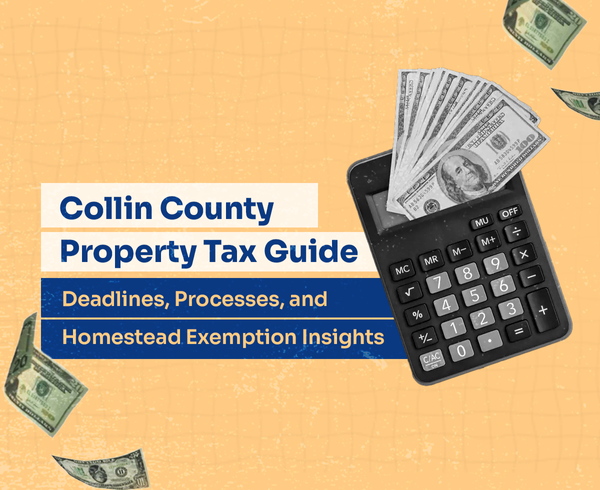Homeownership in Collin County entails a solid grasp of property tax obligations. Our guide ensures that you’re well-informed on due dates, payment procedures, and how to capitalize on tax exemptions.
Key Property Tax Deadlines in Collin County
- Important Tax Payment Dates
- November 30, 2025 - Initial half-payment deadline for 2025.
- January 31, 2026 - Final day for settling 2025 tax dues without added charges. (If there is a pending lawsuit from previous years, legal fees are appended to the 2025 tax statement on February 1, 2026.)
- March 31, 2026 - Last day to settle 2025 commercial personal property taxes before incurring legal charges.
- Apr 15,2026 -The Collin County Appraisal Board is expected to send the 2026 assessment values.
- May 15, 2026 - Last day to property tax protests with Collin County appraisal district. You can file your protest online.
- June 30, 2026 - Deadline for second half payment. The last opportunity to arrange payments for overdue 2025 taxes to circumvent legal charges is July 2, 2026.
Note: If the date falls on a weekend, it extends to the subsequent working day.
- Quarterly Payment Schedule
- Initial Payment by: January 31, 2026;
- Second Payment by: March 31, 2026;
- Third Payment by: May 31, 2026;
- Fourth Payment by: July 31, 2026.
Note: In case the date falls on a weekend, it’s extended to the immediate next working day.
- Quarterly Installments:
- A delay in any quarterly installment results in an initial 6% charge for the first month, coupled with 1% monthly interest until the balance is cleared.
- Remember, participation in the Quarterly Installment Plan in February comes with an added 7% charge. See penalty and interest chart.
Source: Collin County Tax Office Website
The Property Taxation Process in Collin County: Step by Step
- Assessment: In Collin County, properties are valued based on factors like location, property condition, and comparable property values in the area.
- Notification: Taxpayers will be notified of their tax amount through the mail.
- Payment: Payments can be made online, via mail, or in person at designated locations.
- Delinquency: If taxes aren't paid on time, penalties accrue and can lead to legal consequences.
Homestead Exemption in Collin: What It Is and How It Relates
- Introduction & Benefits: The homestead exemption reduces the taxable value of a property, potentially leading to lower taxes. Read more
- Qualification Criteria: Residents must own and reside in the property as their primary residence.
- Application Process: Residents can apply by filling out the necessary form and submitting it to the Collin County Appraisal District.
Tips for Collin County Homeowners
- Maximizing Savings: Look into all available exemptions and ensure your property is assessed accurately.
- Staying Informed: Subscribe to updates from the Collin County Appraisal District.
- Seeking Assistance: If unsure about any step, don't hesitate to reach out to local resources or experts.
Homestead Exemption Audit- Senate Bill (SB) 1801
The Texas legislature passed Senate Bill (SB) 1801 during the 88th regular session, effective September 1, 2024. This bill mandates the Collin Central Appraisal District to initiate a program for the periodic review, at least every 5 years, of residence homesteads, granted exemptions under Texas Property Tax Code Section 11.13.
The Chief Appraiser must verify that the exemption recipients still qualify. Importantly, there are no fees associated with filing for an exemption application with the Collin Central Appraisal District.
You can apply for homestead exemption easily using Bezit's DIY online service.
Collin County Property Tax & Homestead Exemption FAQs
- What is property tax in Collin County?
- Property tax is an annual levy on homeowners based on the value of their property, funding local initiatives.
- How is my property assessed for tax purposes in Collin County?
- The county’s appraisal district evaluates properties based on factors like recent sales of comparable properties and unique property attributes.
- How can I check my property tax online?
- Check out property tax online at Bezit's for an easy way to view and manage your property taxes.
- How does the homestead exemption work in Collin County?
- It offers a reduction in the taxable value of your property, thereby reducing your overall tax bill. You can file for online Homestead exemption using Bezit.
- Who qualifies for the homestead exemption in Collin County?
- Homeowners who use the property as their primary residence as of January 1 of the tax year.
- How do I apply for the homestead exemption in Collin County?
- Obtain and submit the application form to the Collin County Appraisal District.
- Is there a fee to apply for the homestead exemption in Collin County?
- No, applying is free.
- If my house is valued at $500k in Collin, how much would I save with Homestead exemption?
- If you apply for a residence homestead exemption, you can save up to 20% on property tax.
- Where can I get more information or assistance about property taxes and exemptions in Collin County?
- For detailed insights and assistance, consult the Collin County Appraisal District or explore Bezit’s extensive resources online.

